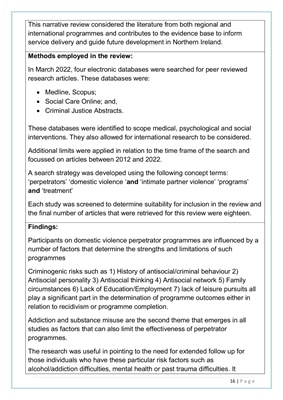
16 | P a g e
This narrative review considered the literature from both regional and
international programmes and contributes to the evidence base to inform
service delivery and guide future development in Northern Ireland.
Methods employed in the review:
In March 2022, four electronic databases were searched for peer reviewed
research articles. These databases were:
• Medline, Scopus;
• Social Care Online; and,
• Criminal Justice Abstracts.
These databases were identified to scope medical, psychological and social
interventions. They also allowed for international research to be considered.
Additional limits were applied in relation to the time frame of the search and
focussed on articles between 2012 and 2022.
A search strategy was developed using the following concept terms:
'perpetrators' 'domestic violence 'and 'intimate partner violence' 'programs'
and 'treatment'
Each study was screened to determine suitability for inclusion in the review and
the final number of articles that were retrieved for this review were eighteen.
Findings:
Participants on domestic violence perpetrator programmes are influenced by a
number of factors that determine the strengths and limitations of such
programmes
Criminogenic risks such as 1) History of antisocial/criminal behaviour 2)
Antisocial personality 3) Antisocial thinking 4) Antisocial network 5) Family
circumstances 6) Lack of Education/Employment 7) lack of leisure pursuits all
play a significant part in the determination of programme outcomes either in
relation to recidivism or programme completion.
Addiction and substance misuse are the second theme that emerges in all
studies as factors that can also limit the effectiveness of perpetrator
programmes.
The research was useful in pointing to the need for extended follow up for
those individuals who have these particular risk factors such as
alcohol/addiction difficulties, mental health or past trauma difficulties. It